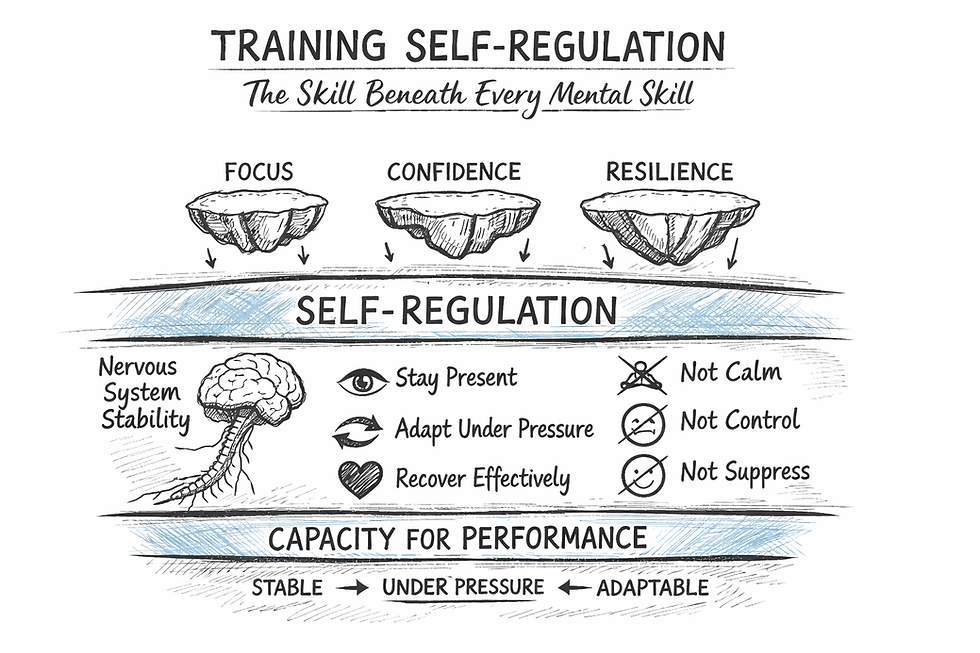2 Benefits Mindfulness Meditation Will Bring to your Sports Performance
- Kate Allgood
- Aug 1, 2022
- 4 min read
Updated: Dec 18, 2023

Mindfulness is about purposely being aware of the present moment, and accepting things as they are without judgement. As an athlete your attention is one of your best and most important resources and muscles that needs to be firing on all cylinders in order for you to perform at your best. Mindfulness meditation is a practice that helps you build your attention, and it is one of the best ways to do so. So much of your performance and how you feel about your performance comes down to your attention. Feeling in or out of sync, your emotions, sense of fulfillment, ability to make a play or refocus. It is what allows you to display your physical skills, but you have to train it in order to explore the limits of your potential.
I understand the difficulties and perceptions that sometimes exist around mindfulness mediation. It is hard when you are wired for constant doing and action, to just be. To focus more on noticing and observing rather than doing. Sitting there and trying to just focus on your breath can lead to the ego trying very hard to distract you through thoughts or physical discomfort. However, if you want a peak mind, it is necessary to train using mindfulness meditation.
Benefit #1 - Attention
I have already mentioned how important your attention is, and this is a key benefit for mindfulness meditation. You need the ability to be present as much as possible, and to notice when you are not being present and bring yourself back, fast! Your ability to perform comes down to your attention and are you able to pay attention to the right thing at the right moment. If not you will under perform. Your attention is a muscle, and like any other muscle needs to be trained to strengthen it, so that it can withstand the pressure and tension that comes with your sport and performing under pressure.
Benefit #2 - Emotional Regulation
The ability to control and regulate your emotions often means the difference between winning and losing. Your emotions are one of the many things that can yank your attention away from the present moment, and make it harder to focus on the right thing. Your emotions also impact how in sync your mind and body are, which is necessary for high performance. When you have strong negative emotions, you are more out of sync and with it, you loose hand eye coordination, and higher levels of decision making, along with many other things.
You also don't want your emotions and mental energy to be too low, either. This is also apart of the equation and you need to be able to regulate your emotions to hit the sweet spot for you. Mindfulness mediation allows you to become more of an observer of your emotions, rather than them defining you and your performance. As you observe you don't get attached and therefore can make a choice of an action step to take to help you regulate your emotions to get to where you need to be. If we don't create the space between ourselves and our emotions, then the emotions decide what we think, say or do. The space is created when you can find more of an ability to be the observer of your emotions.
"Meditation can help you go with the flow. Let your thoughts pass like ships in the night." – Kobe Bryant
Mindfulness Meditation Strengthens your Mind
Mindfulness meditation is like doing pushups for your mind. You need to strengthen your mental muscle to help you with both your attention and emotional regulation. Two factors that are very important when it comes to mindset training to help you perform at your best. To learn more about mindfulness meditation and how we can help build you a program please contact us.
To your success,
Kate Allgood, Owner.
About: Kate Allgood is trained in the field of applied sport psychology. She holds two Masters degrees in psychology where she graduated with distinction. She has spent the past 14 years working one on one with high school, college, Olympic, and professional athletes to help them with their mindset, mental performance and mental skills training. Kate has also been a consultant for professional teams, including the Anaheim Ducks primary minor league affiliate the San Diego Gulls, to help the team and players develop their mental game. It is important to note that while Kate has graduate school training in applied sport psychology and general psychology, she does not diagnose or treat clinical disorders, and is not a licensed psychologist.
**The information provided is not to dispense medical advice or prescribe the use of any technique, either directly or indirectly, as a form of treatment for physical, emotional, or medical problems, without the advice of a physician. The information provided is only to offer information of a general nature to help you in your quest for high performance. If you know or suspect you have a health problem, it is recommended you seek your physician's advice.



Comments